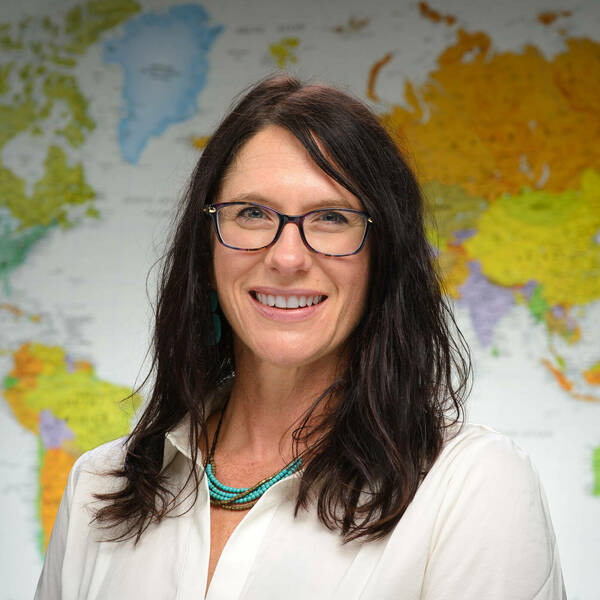Pulte Director Presents at National Academies Event on Housing and Disasters

As the world grapples with the accelerating impacts of climate change, disaster preparedness and recovery strategies are shifting to meet the demands of a more volatile and interconnected landscape. Traditional frameworks that treat disasters as isolated events are now outdated in the face of back-to-back catastrophes, where regions barely have time to recover before the next blow. These "compounding disasters" create new challenges, with infrastructure and communities struggling to withstand the cumulative effects. This evolving reality calls for bold, innovative thinking and transformative leadership.
Dr. Tracy Kijewski-Correa, the William J. Pulte Director of the Pulte Institute for Global Development at the University of Notre Dame’s Keough School of Global Affairs, is at the forefront of this movement. As a distinguished professor of Civil Engineering and Global Affairs, Kijewski-Correa’s research centers on enhancing the resilience and sustainability of communities vulnerable to climate hazards. With a specialized focus on disaster risk reduction and climate adaptation, her work pushes the boundaries of engineering and policy to ensure that vulnerable populations have the shelter and security they need amid escalating threats.
Kijewski-Correa’s expertise in infrastructure resilience and her leadership in mobilizing engineering networks globally garnered her a spot in a recent edition of the Climate Conversations: Pathways to Action series hosted by the National Academies of Sciences, Engineering, and Medicine. This monthly webinar series convenes experts to discuss high-level strategies for addressing climate change and its myriad impacts. In a session moderated by Christopher Flavelle of The New York Times, Kijewski-Correa was joined Carlos Martín of Harvard University in a discussion on housing resilience, access, and the urgent need to redesign our disaster frameworks for a new reality of persistent, overlapping crises.
The event explored questions that sit at the heart of Kijewski-Correa’s work: How can we build housing that withstands not just one storm but a series of disasters? What strategies are needed to ensure housing remains a source of stability for those at risk? These questions reflect her commitment to addressing some of the world’s most complex and interconnected challenges.
In addition to her role at the Pulte Institute, Kijewski-Correa serves as the inaugural director of the Structural Extreme Event Reconnaissance (StEER) network, a collaborative initiative that leverages global engineering expertise to evaluate the impacts of extreme weather events on communities. Through StEER, she has mobilized teams of engineers to assess disaster-affected areas worldwide, gathering data that will shape future policy and disaster response frameworks. Her hands-on approach underscores her dedication to creating practical, research-backed solutions that improve lives on the ground.
By participating in this timely and prominent conversation, Kijewski-Correa continues to champion a vision for resilient housing that adapts to a changing climate and meets the needs of at-risk communities. Her expertise will no doubt shed light on the path forward, as policymakers, communities, and researchers strive to build a safer, more sustainable future for all.
View the event recording below:
Originally published by at pulte.nd.edu on November 04, 2024.
Latest Research
- Center for Broader Impacts helps Notre Dame researchers enhance their mentorship skillsNational Science Foundation Director Sethuraman Panchanathan recently challenged students to pursue an ambitious goal—not one for their own success but one focused on the success of others.…
- Is depolarization possible?Notre Dame political scientist studies cross-partisan chat discussions Erin Rossiter is willing to stick her hand in the sizzling-hot fire of political discussions in a deeply polarized America. The Notre Dame political…
- Meenal Datta receives 2024 Cellular and Molecular Bioengineering Young Innovator AwardMeenal Datta, assistant professor of aerospace and mechanical engineering, has received a Cellular and Molecular Bioengineering Young Innovator Award. The award, given by the journal of the Biomedical Engineering Society (BMES), recognizes 12 “rising stars” in the field of biomedical engineering each year.
- Secretariat President Joseph Blanco '92 challenges Sheedy Program students to be servant leaders in businessBy Marcela Rodriguez Holguin What do seminary and business school have in common? …
- Institutional Renewal: ND's Investment in DemocracyWe are living through a profound global referendum on democracy. In 2024, more than half the world’s population…
- Notre Dame Law School's Exoneration Justice Clinic welcomes new legal fellowNotre Dame Law School’s Exoneration Justice Clinic (EJC) has recently hired a new full-time legal fellow, Matt Binder. Initially, Matt will be working on all EJC cases, but he will eventually focus…












